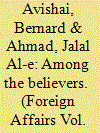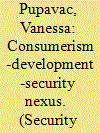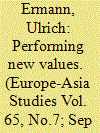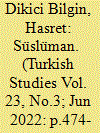| Srl | Item |
| 1 |
ID:
127931


|
|
|
|
|
| Publication |
2014.
|
| Summary/Abstract |
In the early 1960s, Jalal Al-e Ahmad was one of Iran's leading literary celebrities, a writer whose works deeply impressed the dissident clerics who would go on to found and lead the Islamic Republic. Born to a devout family in Tehran in 1923, a boy in the bazaar, Al-e Ahmad had drifted away from the faith and eventually earned a degree in Persian literature. He flirted with the communist Tudeh Party of Iran in the 1940s but broke with it for being too pro-Soviet; then, he helped found (and later left) a workers' party that supported Mohammad Mosaddeq, who was elected prime minister of Iran in 1951. After the 1953 coup that toppled Mosaddeq, Al-e Ahmad succumbed to pressure from the shah's regime and renounced politics entirely, publishing a letter "repenting" for his prior participation. He returned to his roots and seemed to find his vocation, becoming famous throughout Iran as a novelist, essayist, and underground polemicist, especially for his 1962 book Gharbzadegi, or "West-struck-ness" (published in English as Occidentosis or sometimes Westoxification).
|
|
|
|
|
|
|
|
|
|
|
|
|
|
|
|
| 2 |
ID:
101491


|
|
|
|
|
| Publication |
2010.
|
| Summary/Abstract |
Critics of global governance have been influenced by Foucault's analysis of modern total institutions disciplining both the mind and the body. However, Foucauldian biopolitics may present global governance too smoothly. This article takes critiques arguing that consumer capitalism's divorce from industrial production encourages romantic understandings of global problems and applies them to development aspects of the development-security nexus. It discusses three influential economists each of whose work is emblematic of consumer capitalism's international development vision at particular historical junctures. The article outlines how Rostow's The Stages of Economic Growth, arising during the postwar economic growth boom, envisages developing countries becoming consumer societies at the highest stage of development, but also anticipates consumer society's romantic critiques of modernity. It next examines Schumacher's Small Is Beautiful and his Buddhist economics, arising in the post-Bretton Woods crisis period, as symptomatic of re-emerging romantic critiques of society. Finally, it discusses Sen's human development approach as a market romance illustrating consumer capitalism's individual-orientated development strategies. The article concludes that the contemporary development romance addresses neither people's basic needs nor their aspirations, and it problematizes global governance's ability to secure and govern populations.
|
|
|
|
|
|
|
|
|
|
|
|
|
|
|
|
| 3 |
ID:
122824


|
|
|
|
|
| Publication |
2013.
|
| Summary/Abstract |
In post-socialist societies, marketing and consumption play a crucial role for what is regarded as value. Assuming 'consumer capitalism' as an important feature of the neoliberal project, I argue that marketing theories and practices produce market societies in Eastern and Central Europe. To highlight the reflexive adaptation of 'consumer capitalism' by producers, marketers and consumers, this essay discusses fashion brand promotion in Bulgaria. The case studies illustrate how the transformation of modes of valuation can be understood as a process of performative modernisation and marketisation. It appears that the 'local' adjustment of 'global' concepts of marketing and consumption leads to new formations of value in spatial, temporal and subjective terms.
|
|
|
|
|
|
|
|
|
|
|
|
|
|
|
|
| 4 |
ID:
185550


|
|
|
|
|
| Summary/Abstract |
This article argues that class divisions within Islamist community are an emerging aspect of contemporary Turkish politics. Nearly two decades of rule by an Islamist party enabled the Islamic capital to become a distinct capital fraction without improving the living conditions of the devout masses substantially. This fault line appears in the increasingly discernible criticism of the everyday lifestyles of rich Muslim women from within. Controversy over the extravagance of veiled women appears as a proxy class struggle between the new Islamic middle class and the devout poor, as well as the continued polarization between the Islamists and the secularists.
|
|
|
|
|
|
|
|
|
|
|
|
|
|
|
|